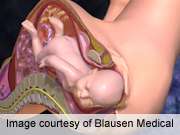Risk of serious complications in obstetric anesthesia is low

(HealthDay)—The risk of serious complications in obstetric anesthesia is low, according to research published in the June issue of Anesthesiology.
Robert D'Angelo, M.D., of the Wake Forest University School of Medicine in Winston-Salem, N.C., and colleagues analyzed data from nearly 257,000 patients who received neuraxial or general anesthesia for delivery. The authors sought to assess serious complications associated with obstetric anesthesia.
The researchers found that the most frequent serious complications of obstetric anesthesia were high neuraxial block, respiratory arrest in Labor and Delivery, and unrecognized spinal catheter. A serious complication occurred in approximately one in every 3,000 episodes of obstetric anesthesia (95 percent confidence interval, one in every 2,443 episodes to one in every 3,782 episodes).
"Because serious complications related to obstetric anesthesia are rare, there were too few complications in each category to identify risk factors associated with each," the authors write. "However, since many of these complications can lead to catastrophic outcomes, it is recommended that the anesthesia provider remain vigilant and be prepared to rapidly diagnose and treat any complication."
More information: Full Text
Copyright © 2014 HealthDay. All rights reserved.



















